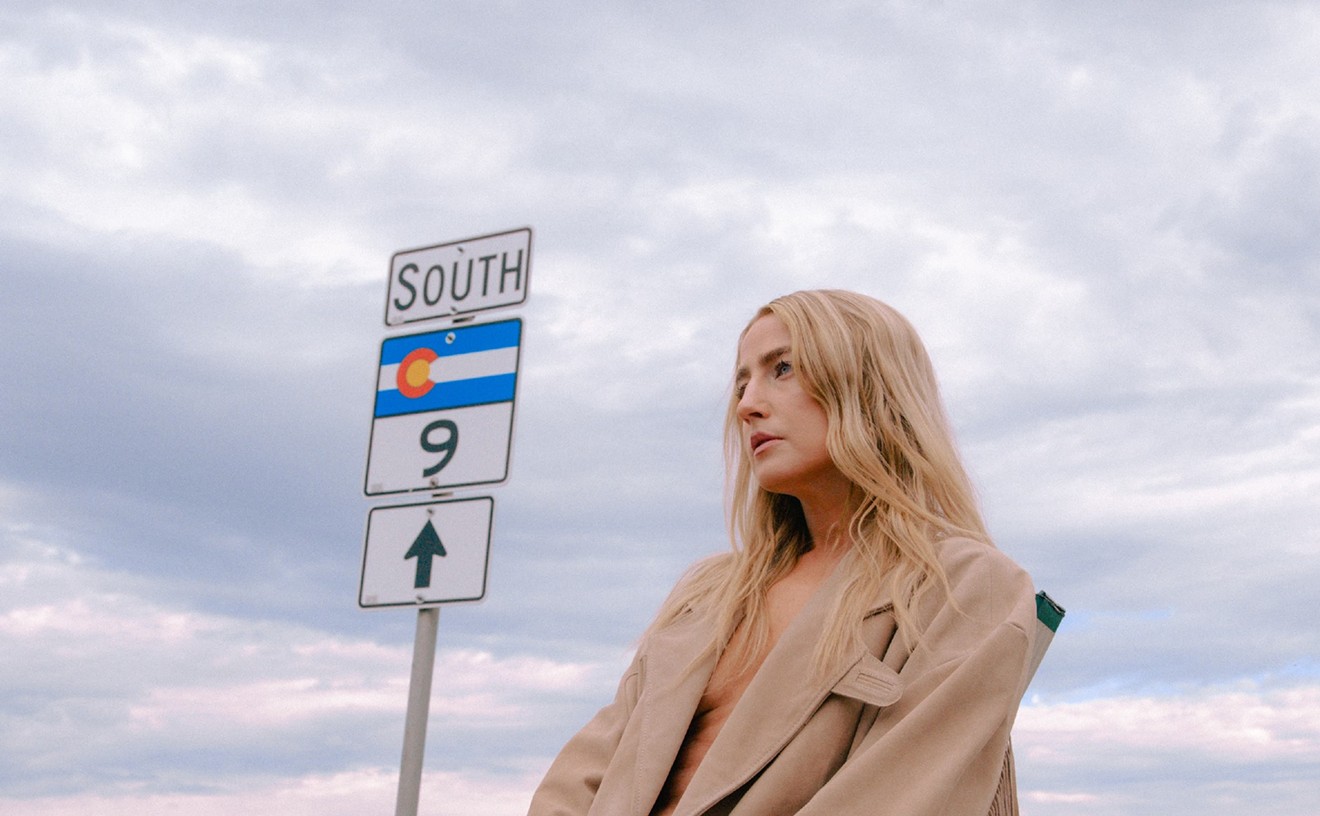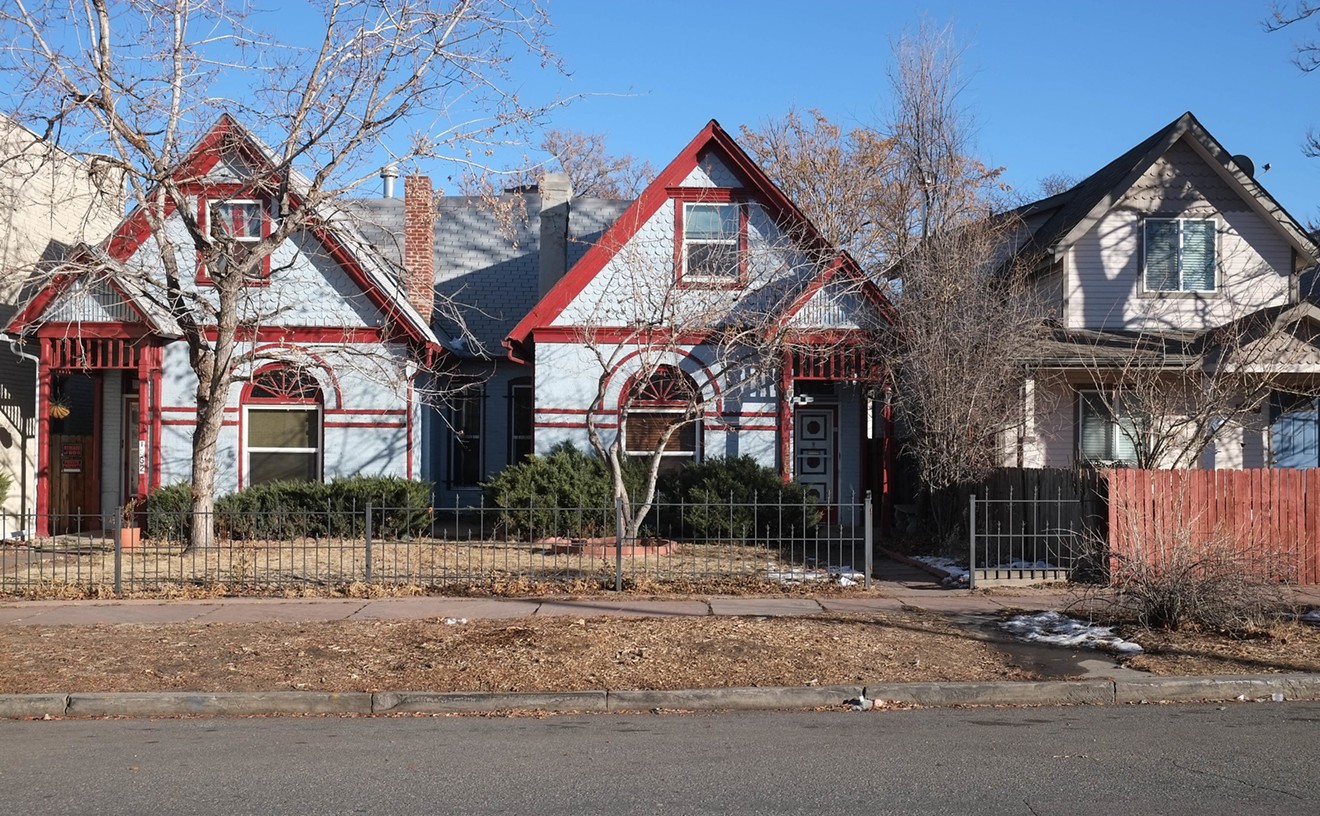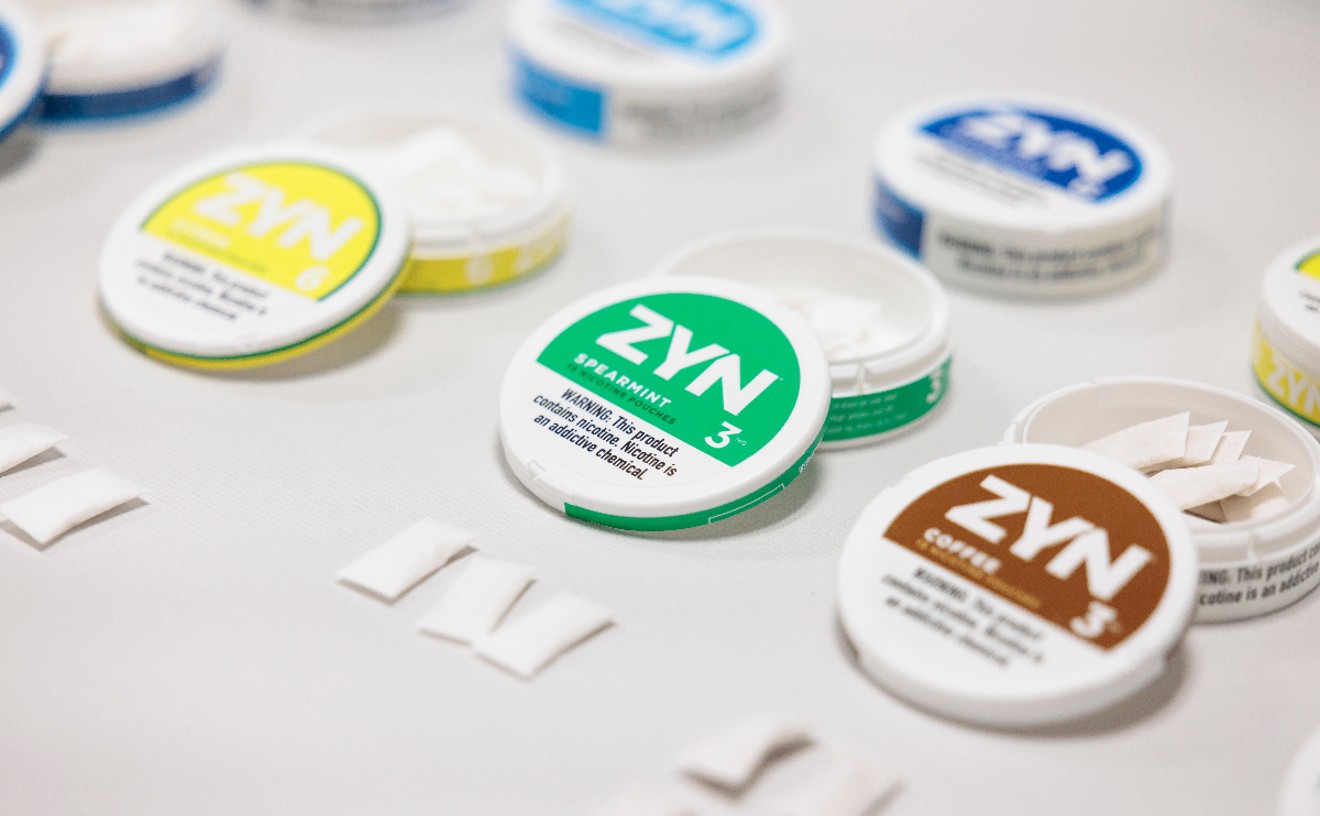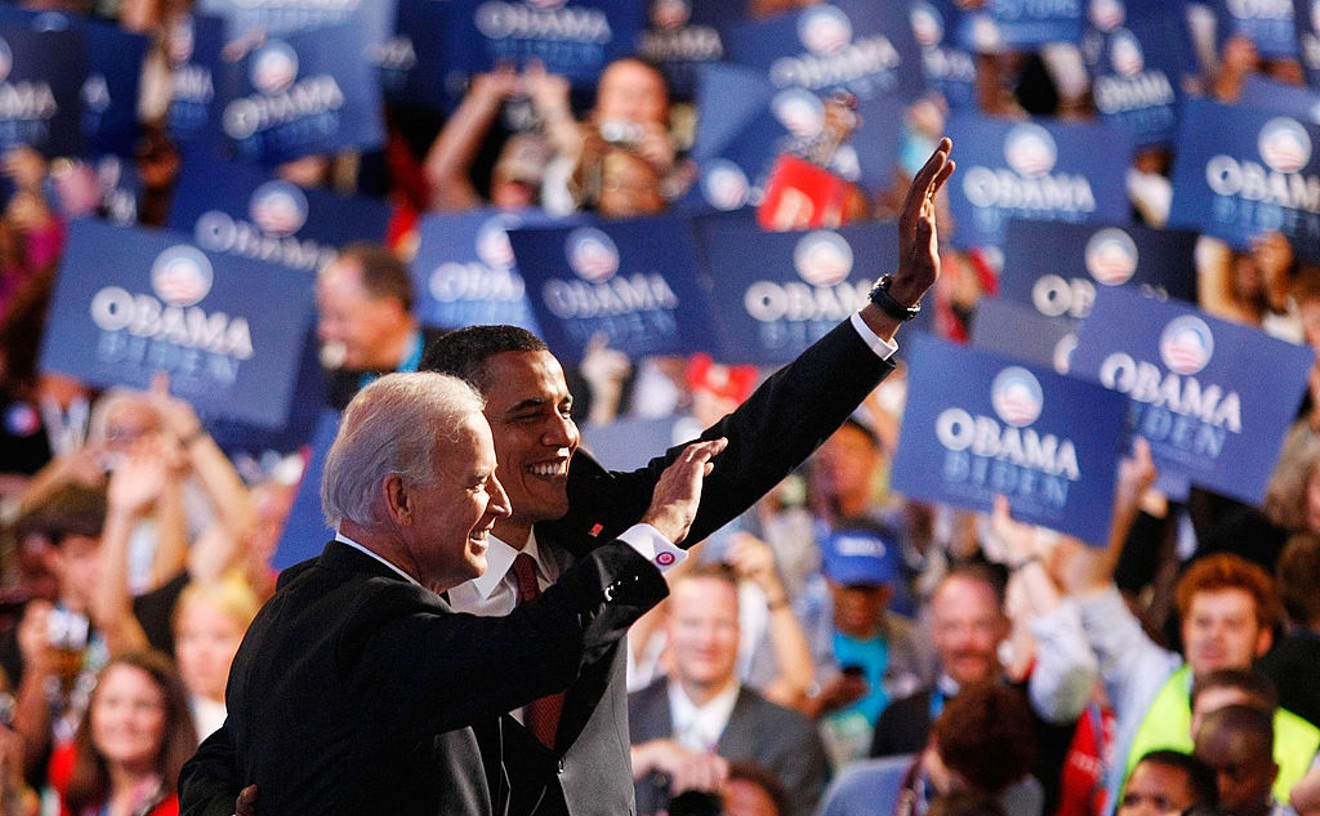4:50 p.m.: On cross-examination of Marshall, defense attorney Abraham Hutt asked him about lying to the police detectives when they first interviewed him. He pointed out that Marshall first told police that there were only four men in his limo that night; he failed to mention that his cousin, Blair Clark, and Elvis Dumervil were there.
"I don't remember what I told them or not," Marshall said.
Hutt also asked him whether he also simulated having a gun during his argument with the man with the sunglasses. Marshall denied it, even though he admitted that he told Detective Michael Martinez that he was probably making gestures with his hands.
After Hutt questioned him, Twining asked a few more questions about the man with the sunglasses. During them, Marshall became frustrated. "That's the guy," he said, "in that picture, in that video and sitting at this table right here." He pointed straight at Clark.
A man named Shane Park took the stand next. Park is an electrical lineman; on January 2, 2007, Park said he found a gun barrel in a field near 38th Avenue and Himalaya Road while he was working. He said he called his supervisor, who called the police.
Aurora Police Department Officer Dustin Clark testified next. He said he picked up the gun barrel where it was found; it didn't look like it had been lying there very long, he said.
Denver Police Department detective Shane Webster testified that he took the gun barrel from the Aurora police and entered it into evidence. He said the significance of the gun barrel was unclear at the time, although it had been found in the area of a "vehicle of interest" in the Williams murder case. That vehicle was a burned-up Tahoe, he said.
Court ended just after 4 p.m. The trial is scheduled to resume at 9 a.m. Monday.
After the jury left for the day, Judge Christina Habas advised Clark of his right to testify -- or not to testify -- in his own case. "I researched this whole thing," Clark told her. Habas said she'll ask Clark for his decision after the prosecution rests its case.
Prosecutors indicated that they'll take photos of Clark's tattoos later today, though Habas said she doesn't know yet whether she'll admit them into evidence. Previously, prosecutors have said that Clark has 3's tattooed on his chest, signifying an affiliation with the Tre Tre Crips gang, as well as a tattoo that says "M.O.B.," which stands for "Money Over Bitches."
Defense attorneys again complained to the judge that young black men attending the trial to support Clark were being harassed by law enforcement; this time, Cantor said, a man was stopped outside the courthouse during the lunch break by the Denver police. Habas said the situation was disappointing if true, but added that there was little she could do to control how police acted outside her courtroom.
3:47 p.m.: After lunch, Crider briefly took the stand and answered a few technical-type questions from defense attorney Abraham Hutt about the crime scene and how it was taped off.
Bronco Brandon Marshall took the stand next. He wore a navy colored suit, a bright blue collared shirt and a purple tie. He leaned into the microphone and spoke clearly.
When Prosecutor Tim Twining asked him if he remembers the night of New Year's Eve 2006, Marshall answered simply: "I think about it every night," he said.
Before asking that, Twining asked Marshall about his background. Marshall said he grew up in Pittsburgh and Florida in neighborhoods he described as "the ghetto," where he was "surrounded" by gang activity.
Then Marshall told the jury what he did that night. At around 11:45 p.m., he said he, his cousin Blair Clark, teammate Elvis Dumervil, his brother, a friend and a neighbor arrived at the Safari club in a rented Lincoln town car. Marshall was the co-host of a party there that night, he said.
When they pulled up, there was a crowd outside trying to get in, he said. Marshall said he tried to get a bouncer's attention so they could bypass the line, but the bouncer told him to hold on a minute, and he got mad. "My words was, 'Y'all put my name on the flier and you're making money off my name and you leave me out here?' Then the guy recognized me and tried to get us through the crowd," he said.
"When that happened, a guy with dark glasses and a little hoodie, he turned around and said, 'We street niggas, we got money too.' And just being where I'm from, trying to diffuse the situation, I said to him, 'If I ain't the only one with money, then drinks is on y'all tonight,' trying to make a joke.
"The guy with the glasses didn't laugh. He stayed serious."
A skinny, light-skinned man who was with the man with the sunglasses was cool, though, Marshall said. "He said, 'What you drinking?' And I said, 'It doesn't matter, man. Just meet me by the bar.'" The man with the glasses kept frowning, he said. Marshall said he pointed out the two men to the bouncer and told him to make sure they got in.
Later, at the police station, the detectives asked Marshall to look at a photo lineup and identify the man with the sunglasses. He did, and Twining showed that photo to the jury: It's Clark.
Once inside the club, Marshall said he went upstairs to the VIP section with Dumervil. The rest of his party stayed downstairs, he said. Williams and his entourage were already upstairs, Marshall said, and at some point, he noticed an altercation between Williams's entourage and the men who he'd run into outside. "I just see a couple guys in Darrent and his party's face and they're throwing up signs," Marshall said. "And I remember Darrent's friends, family or whoever it was just vibing to the music and not paying too much attention, but not backing down." He and Dumervil stepped in, he said, and tried to help diffuse the situation. "And my words was like, 'We got all these bottles of champagne up here, all these women, it's not that serious, just party with us.'"
Marshall said he never saw anyone spray champagne.
When the club started closing down, Marshall said he tried to be the last one out for security reasons. At that time, he said, he ran into fellow Bronco Javon Walker and they chatted for a few minutes. Let-out, which Marshall described as "parking lot pimpin'," was going on outside; Marshall said let-out is generally a "dangerous situation."
When he got outside, Marshall said he saw his cousin, Blair Clark, and one of the men who arrived with Williams arguing. He and Williams calmed them down, he said. "We end up getting that straightened up," he said, "and then I remember guys on the sidewalk throwing up signs or whatever." The guys throwing up signs were the same guys from the earlier run-ins, he said: the guy with the sunglasses and his light-skinned friend.
"This is when I got angry a little bit," Marshall said, "and my first words were, 'Calm down man, I done offered you drinks... I done offered you to party with us.' I'm saying this out loud." There was a lot of cursing, he said, and "words being exchanged."
The man with the sunglasses then lifted up his shirt like he had a gun, Marshall said. "I said, 'Man, you ain't got no fuckin' gun,'" he said. But Marshall said the gesture made him angrier. "I probably got angry at the time and probably escalated the situation," Marshall said. People started grabbing at him, he said, and at the man with the sunglasses. Marshall said he tried to climb over a snowbank that separated him and the man but he slipped. That's when the light-skinned man punched him in the jaw, he said.
After the punch, the men on the sidewalk scattered, Marshall said. To him, that was a cue to leave as well. "Again, being from where I'm from, there ain't no police there breaking up no fight... and the guys take off, the light should go off: Danger."
Marshall said he and his party got back into their limo and took off. Williams's Hummer limo was still in front of the club, he said. But soon after dropping off some women at their cars, Marshall's limo passed the Hummer stopped on the side of Speer. Marshall said he wanted to stop but a friend of his convinced him they should keep going.
Marshall became emotional when he testified about what happened next. He said he got a phone call that Williams was dead and headed straight to the hospital. There, he said he ran into Walker, who was covered in blood; he was clutching Williams's medallion necklace and kept repeating that Williams had asked him to hold on to it.
Marshall's voice became shaky and he held a tissue in his hand.
12:46 p.m.: The courtroom is pretty full today, especially in the rows reserved for Willie Clark's friends and family. Clark is seated with his attorneys, wearing a dark sweater over a white button-up shirt. Like always, he appears to be paying a lot of attention to the testimony and evidence, and scribbling notes on a legal pad.
After a short morning break, Denver police Officer Clifford Stump, who responded to the shooting scene, took the stand. He testified that the 911 call came through at 2:18 a.m. and he got to the scene at 2:20 a.m.
When he arrived, he said he saw two black men in front of a Hummer limo that had pulled off into the snow at 11th Avenue and Speer Boulevard. They were "distraught," he said, and were yelling, "Someone's been shot! Someone's been shot!" Stump said he went to the back door and saw that there were three or four people holding up a black man, who was dribbling blood from his neck. About three to five minutes after he arrived, he said, medical personnel arrived and took the man to the hospital.
Defense attorneys did not cross-examine Stump, whose involvement with the shooting ended after he followed the ambulance to the hospital.
Nicole Reindl, who was in the limo that night and was shot in the head, testified next. On New Year's Eve 2006, Reindl said she was a senior at the University of Colorado in Boulder. She said she made plans to celebrate New Year's Eve in Denver with friends from high school. At around 11 p.m., they went to a club called Spill, where she said Bronco Javon Walker, who knew a friend of hers, got them into the VIP section.
Reindl said they left Spill just before midnight and headed to the Safari club. There, she said, they hung out in the upper-level VIP section. She said she spent most of the night hanging out on a couch with her friends and didn't pay attention to any altercations.
When the club closed at around 2 a.m., Reindl said she headed straight for a white Hummer limo that was parked directly outside. The Broncos had offered her and her friends a ride home to 13th Avenue and Speer.
At 2:16 a.m., Reindl said she felt her cell phone vibrate. She bent down to answer it, she said, and almost at the same time, a friend sitting next to her pulled her onto the floor of the limo. "I didn't realize we'd been shot at until I hit the ground and looked up and saw bullet holes in the window," Reindl said.
Once the limo stopped and Reindl got out, she said she realized that she'd been shot in the back of the head; she was bleeding "profusely." "It was very surreal," she said. Reindl said the bullet is still lodged in her head, though she hopes to one day remove it.
Again, defense attorneys did not cross-examine her.
Denver Police Department Detective Mark Crider took the stand next. For nearly an hour, he went through a series of photos of the crime scene and identified them for the jury. The photos show blood stains and expended bullets on the pavement, smeared blood and bullet holes inside the limo, and bullet holes in the windows. One photo showed strings crisscrossing the inside of the limo; each string represents a different bullet's trajectory.
Prosecutor Bruce Levin also asked Crider about some running he did in connection with the investigation. Crider said he ran from 11th and Speer to 10th Avenue and Lincoln, wearing hiking-type shoes, in seven minutes and fifty-five seconds.
Levin didn't make it clear why he was asking the question. But prosecutors have suggested that Daniel "PT" Harris was in the car that shot at Williams' limo at around 2:15 a.m. Earlier today, Felix Abram testified that he saw Harris walking down Lincoln in the area of 10th Avenue later that morning, likely sometime after 2:22 a.m.
The court took a lunch break at 12:35 p.m. The trial is expected to resume at 1:35.
11:07 a.m.: Just after 9 a.m., Felix Abram took the stand again. He said that as he was returning to his car, which was parked near Lincoln Street, in the early hours of New Year's Day 2007, he saw Daniel "PT" Harris -- who prosecutors have said is a key witness -- walking down the the middle of the street, talking on his cell phone to his sister.
Harris told Abram his sister had been maced during the altercation outside the Safari club and was at a Shell gas station on Colfax Avenue near Kalamath Street, Abram said.
Abram said he offered Harris a ride to the Shell to check on his sister.
Abram turned onto Speer Boulevard to get to the Shell, but was turned around by the police, who had blocked off the road, Abram said. He said he saw the white Hummer limo that was carrying Darrent Williams and his friends on the side of Speer.
Abram said he took Kalamath to the Shell, where he, Harris and his cousin, Henderson Abram, spent twenty to thirty minutes helping Harris's sister. Then, Abram said, he either dropped Harris off at his car or drove directly home. That was it, he said.
On cross-examination, defense attorney Darren Cantor tried to prove that Abram is a liar. "Is it fair to say that you have no trouble lying to get yourself out of trouble?" Cantor asked him. "I don't believe so," Abram said. Cantor spent the next hour trying to prove him wrong, using transcripts of Abram's previous statements and testimony to show that his story had changed over time.
Abram and Cantor went back and forth; at times, the judge had to stop them for being too "argumentative." But Abram's voice was calm. He didn't seem intimidated.
Cantor alleged that, when previously talking to police detectives and the grand jury, Abram often answered questions with questions in order to give himself more time to think about a good answer. Abram did the same thing this morning; for example, he answered a question about whether he previously testified that he told his friend Vernone Edwards that Darrent Williams was throwing up Blood gang signs that night with a question: "I told Vernone Edwards that? No."
However, Abram defended the way he answered lawyers' questions: "Most of the questions you guys ask, you kind of lead and direct where you want to go. And me being unwilling for you to lead me in that direction, I think of my answer," he said.
Abram talked about how he was best friends with Harris in 2006 and 2007, and how he told police that he would try to convince Harris to come back to Denver to talk to them about the events on New Year's Eve. (Harris had gone to Mexico shortly after that night and didn't return for five or six months.) "The best thing you can do, sir, is go in and talk to these people and let them know you had nothing to do with it," Abram told Cantor. Abram also told detectives he didn't know exactly where Harris was, Cantor said. At one point, he said Harris was maybe in Mexico, maybe in Venezuela. When the detectives asked Abram to clarify which country, he told them, "Isn't that the same thing?"
Cantor also pointed out that Abram told Detective Michael Martinez in 2007 that he didn't know Harris's last name. He identified him in a photo lineup just as "Dan." "He asks you what Dan's last name is and you lie through your teeth?" asked Cantor. Abram said no. "I'm pretty sure if you ask him what my last name is, he wouldn't know," Abram said.
Abram also admitted to talking to Harris about the case several times when Harris was in Mexico. In all that time, Cantor asked, "Harris never told you whether he was in a car that fired?"
"That is correct," Abram said.
Cantor also brought up Abram's plea deal in his federal drug trafficking case. He made it clear to the jury that Abram was facing up to life in prison and was offered just seven years for his cooperation in this case. Cantor also asked about the details of Abram's crime (which he didn't explain) -- specifically that he tried to keep $7,000 of the profit for himself rather than split it with his co-conspirators. Abram denied doing that, but then Cantor read a transcript of some previous testimony in which Abram admits to it. "You guys take so much stuff out of context," Abram said.
After Cantor finished, Prosecutor Bruce Levin asked some additional questions.
"Were you involved whatsoever in the shooting of the Hummer limo?" he asked.
"No, I was not," Abram said.











